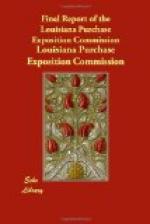money than was then at its command in order to
inaugurate and successfully continue the World’s
Fair. The men who had engineered the magnificent
undertaking to this point in its development reasoned
that, as they had already expended a sum far beyond
that ever given any other similar project, they
might not find a ready response to a request for further
gifts. They were so confident of ultimate success,
however, that they did not hesitate to ask Congress
for a loan of $4,500,000 in order to conduct the
affairs of the exposition.
The legislative committee of the board of lady managers appealed to the Exposition Company and asked that the company add to the amount of the loan for which it desired to negotiate the further sum of $100,000, to be set apart for the exclusive use of the board of lady managers. Receiving the promise that this fund should be included, the members of the legislative committee went to Washington to aid in every way in their power the passage of the bill providing for said loan.
Upon the arrival of the committee in Washington, on January 5, the members found they had undertaken what eventually proved to be a most arduous task against great odds. They found the most deep-seated, persistent opposition to granting another dollar to the fair, and were told President Francis had been advised to defer his trip to Washington until the latter part of January, as it would be hazardous to attempt the passage of the bill until the strong feeling against it then existing had abated. Many members of Congress strongly advised the legislative committee to ask for a special appropriation, but it had been agreed that one appropriation should cover the requirements of both boards.
Mr. James S. Tawney, of Minnesota, a member of the House of Representatives, and chairman of the committee for this and similar appropriations, when in St. Louis had listened with interest to the representation of the subject setting forth the needs of the board of lady managers, and kindly had promised his good offices in helping to advance their cause. He promptly granted an interview when informed that the committee had arrived in Washington, and, while most courteous, did not disguise the fact that there were grave dangers ahead for the loan to the Exposition Company, which had been made a part of the urgent deficiency bill. He examined the budget which had been prepared, giving careful scrutiny to each item, and, after some suggestions and minor changes, a budget was submitted to him which was afterwards used.
On January 29 President Francis
went before the Senate
committee, and on February
1 appeared before the House
committee, on behalf of a
loan for the Exposition Company.




